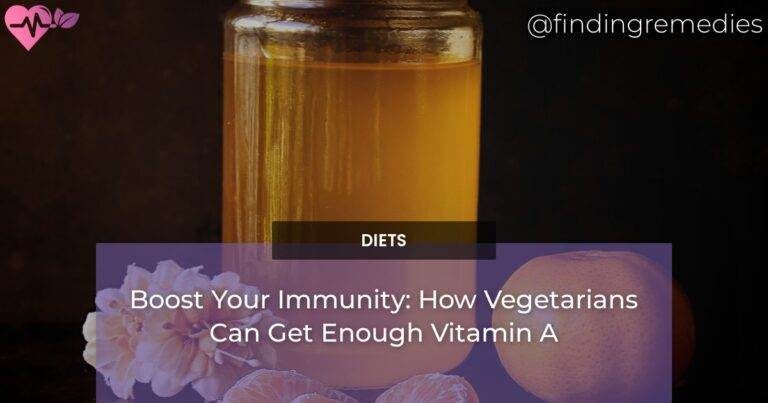Vitamin A is an essential nutrient that plays a crucial role in maintaining our overall health. It is involved in various bodily functions, including vision, immune system function, and cell growth. While it is commonly found in animal products, such as liver, eggs, and dairy, vegetarians and vegans may wonder how they can meet their vitamin A needs without consuming these foods.
Sources of Vitamin A for Vegetarians and Vegans
What are the plant-based foods rich in Vitamin A?
Vegetarians and vegans can obtain vitamin A from a variety of plant-based sources. Some of the top plant-based foods rich in vitamin A include:
- Sweet potatoes
- Kale
- Spinach
- Carrots
- Apricots
- Cantaloupe
- Red bell pepper
- Broccoli
- Butternut squash
- Collards
- Peas
- Mango
- Papaya
These plant-based foods contain carotenoids, which are converted into vitamin A in the body.
What are the vegan dietary recommendations for Vitamin A?
For vegans, it is important to include a variety of vitamin A-rich foods in their diet to ensure adequate intake. The daily recommended intake of vitamin A for adult males is 900 micrograms of retinol activity equivalents (RAE), while adult females require 700 micrograms RAE per day.
What are the beta-carotene-rich foods?
Beta-carotene is a type of carotenoid that the body converts into vitamin A. Some of the best sources of beta-carotene for vegetarians and vegans include carrots, sweet potatoes, spinach, kale, and apricots.
Supplements and Recommended Daily Intake of Vitamin A
How can vegetarians and vegans ensure they get enough Vitamin A?
While a well-planned vegetarian or vegan diet can provide sufficient vitamin A, some individuals may find it challenging to meet their needs solely through diet. In such cases, supplements can be beneficial. Look for supplements derived from plant-based sources, such as algae-based vitamin A.
What are the recommended daily intake of Vitamin A for vegetarians and vegans?
As mentioned earlier, the recommended daily intake of vitamin A for adult males is 900 micrograms RAE, and adult females require 700 micrograms RAE per day. It is important to note that excessive vitamin A intake can be harmful, so it is essential to stay within the recommended limits.
Are there supplements that vegetarians and vegans can take to get enough Vitamin A?
Yes, vegetarians and vegans can opt for vitamin A supplements derived from plant-based sources. These supplements are often made from algae and provide a suitable alternative for individuals who may struggle to meet their vitamin A needs through diet alone.
Vitamin A Deficiency and its Symptoms
What are the symptoms of Vitamin A deficiency?
Vitamin A deficiency can lead to a range of symptoms, including:
- Night blindness
- Dry eyes and impaired vision
- Increased susceptibility to infections
- Delayed growth in children
- Impaired immune function
Can vegetarians and vegans be at risk of Vitamin A deficiency?
While vitamin A deficiency is more commonly associated with individuals who follow a highly restricted diet or suffer from malnutrition, vegetarians and vegans can still be at risk if they do not consume enough vitamin A-rich plant foods. It is crucial to ensure an adequate intake of vitamin A through diet or supplements to prevent deficiency.
How can Vitamin A deficiency be prevented?
To prevent vitamin A deficiency, vegetarians and vegans should focus on consuming a wide variety of vitamin A-rich plant foods. Including foods such as sweet potatoes, kale, spinach, carrots, and apricots in daily meals can help meet the recommended intake. Additionally, considering vitamin A supplements under the guidance of a healthcare professional can also be beneficial.
Risks of Excessive Vitamin A Intake
What are the risks of excessive Vitamin A intake?
Consuming excessive amounts of vitamin A can lead to toxicity, which can have adverse effects on health. Symptoms of vitamin A toxicity can include nausea, dizziness, headache, and even liver damage.
How much Vitamin A is too much for vegetarians and vegans?
For vegetarians and vegans, it is important to stay within the recommended daily intake of vitamin A. Consuming more than 3,000 micrograms RAE of vitamin A per day can increase the risk of toxicity.
Can Vitamin A toxicity result from consuming plant-based foods?
Vitamin A toxicity from consuming plant-based foods is unlikely as the body regulates the conversion of carotenoids into vitamin A. However, it is still important to be mindful of the total intake from all sources, including supplements, to avoid excessive intake.
Cooking Methods to Preserve Vitamin A in Food
How can the cooking method affect the Vitamin A content in food?
The cooking method used can impact the vitamin A content in food. Overcooking, boiling in excess water, or prolonged exposure to heat can cause vitamin A to leach out of the food, resulting in reduced nutritional value.
What are the best cooking methods to preserve Vitamin A in food?
To preserve vitamin A in food, it is recommended to use cooking methods such as steaming, stir-frying, or roasting. These methods help retain the nutrients while enhancing the flavor and texture of the food.
Are there any foods that should not be cooked to preserve Vitamin A?
Some vitamin A-rich foods, such as carrots and sweet potatoes, can be enjoyed raw or lightly cooked to preserve the maximum amount of vitamin A. However, it is important to note that cooking certain vegetables can also enhance the bioavailability of vitamin A, making it easier for the body to absorb.
Conclusion
Vitamin A is an essential nutrient that vegetarians and vegans can obtain from a variety of plant-based sources. By incorporating vitamin A-rich foods into their diet and, if necessary, considering supplements, they can ensure they meet their daily needs for this vital nutrient. It is important to be mindful of the recommended daily intake and avoid excessive vitamin A intake to prevent any potential health risks. Additionally, using appropriate cooking methods can help preserve the vitamin A content in food, ensuring maximum nutritional benefits.

